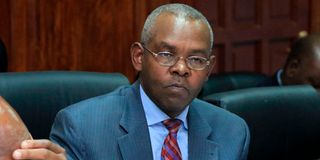This is what awaits Kamau Thugge as he takes over as CBK governor

Kamau Thugge. He was among the six candidates shortlisted in race to replace Dr Patrick Njoroge as CBK Governor
Economist Dr Kamau Thugge officially took over as governor of the Central Bank of Kenya (CBK) yesterday, becoming the tenth person to hold the post.
Dr Thugge, who has been serving as Senior Economic Advisor to President William Ruto, takes over from Dr Patrick Njoroge, who has completed two eventful terms of four years each at the helm of the CBK.
The new CBK governor was nominated by President Ruto from a pool of six shortlisted candidates by the Public Service Commission on April 2, paving the way for his ascension to the top post.
“The Central Bank of Kenya welcomes Dr Kamau Thugge as its tenth Governor. This follows his appointment by the President. Dr Thugge assumed office today,” the CBK said in a statement.
Dr Thugge has held various senior positions in Kenya during his illustrious career, including Head of Fiscal and Monetary Affairs at the National Treasury, Economic Secretary and Senior Economic Advisor.
The former Principal Secretary to the Treasury holds a Bachelor's degree from Colorado College and a Master's and PhD in Economics from Johns Hopkins University in the United States.
Dr Thugge will be hoping that his decades of experience in both the private and public sectors have adequately prepared him for the many challenges he is sure to face as CBK chief.
Weak shilling
On the day the new CBK chief took office, the Kenyan shilling was trading at a record low of Sh140.04 to the US dollar.
This is the official CBK rate, but in the real market, banks and bureaux de change it is exchanging for as much as Sh145.
Just six months earlier, on 3 January, the shilling was trading at an average of Sh123.42, meaning that the local currency has depreciated by 13.4 per cent against the dollar in just six months.
This underlines perhaps the biggest immediate headache that will give Dr Thugge sleepless nights.
Efforts by President William Ruto's government to ease pressure on the shilling, including the much-touted government-to-government importation of fuel on a six-month credit facility, have failed to arrest the slide.
Low forex reserves
Kenya's foreign exchange reserves fell below the legal threshold of at least four months of imports last year, threatening the government's ability to pay its growing import bill and service external debt.
However, reserves were recently boosted after the World Bank transferred a $1 billion (Sh140 billion) loan to the Treasury for budget support on 30 May.
Dr Thugge faces the challenge of maintaining a steady inflow of foreign exchange from key sources such as diaspora remittances, exports, tourism and foreign direct investment.
Checks on cash transactions
Dr Njoroge has proved to be a stickler for the law during his tenure, notably failing to relax the threshold for reporting large cash transactions despite repeated pressure from the executive.
It remains to be seen whether Dr Thugge will follow in Dr Njoroge's footsteps or succumb to pressure from the Executive to relax the strict rules.
Kenya's inflation rate hit 8 per cent in May amid rising costs of food, fuel, electricity and other utilities.
Dr Thugge will be forced to make tough decisions on how to balance the monetary levers available to the CBK to ease inflation.





